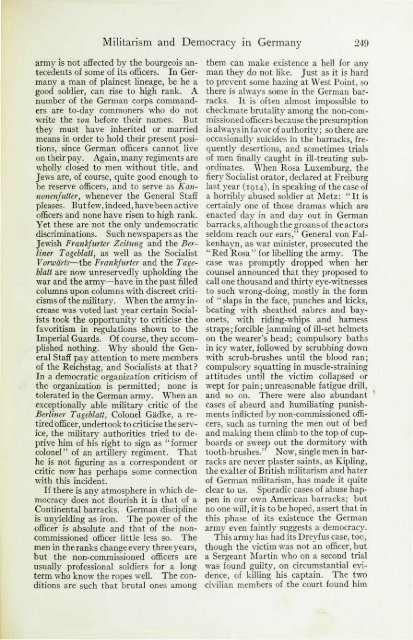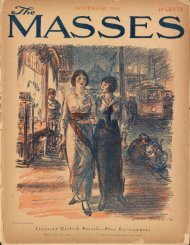View PDF - Brown Library
View PDF - Brown Library
View PDF - Brown Library
You also want an ePaper? Increase the reach of your titles
YUMPU automatically turns print PDFs into web optimized ePapers that Google loves.
Militarism and Democracy in Germany 249<br />
army is not affected by the bourgeois antecedents<br />
them can make existence a hell for any<br />
of some of its officers. In Ger<br />
man they do not like. Just as it is hard<br />
many a man of plainest lineage, be he a to prevent some hazing at West Point, so<br />
good soldier, can rise to high rank. A there is always some in the German barracks.<br />
number of the German corps commanders<br />
It is often almost impossible to<br />
are to-day commoners who do not checkmate brutality among the non-commissioned<br />
write the von before their names. But<br />
officers because the presumption<br />
they must have inherited or married<br />
means in order to hold their present positions,<br />
is always in favor of authority; so there are<br />
occasionally suicides in the barracks, fre<br />
since German officers cannot live quently desertions, and sometimes trials<br />
on their pay. Again, many regiments are of men finally caught in ill-treating subordinates.<br />
wholly closed to men without title, and<br />
When Rosa Luxemburg, the<br />
Jews are, of course, quite good enough to fiery Socialist orator, declared at Freiburg<br />
be reserve officers, and to serve as Kannonenfutter,<br />
whenever the General Staff<br />
pleases. But few, indeed, have been active<br />
last year (1914), in speaking of the case of<br />
a horribly abused soldier at Metz: "It is<br />
certainly one of those dramas which are<br />
officers and none have risen to high rank. enacted day in and day out in German<br />
Yet these are not the only undemocratic barracks, although the groans of the actors<br />
discriminations. Such newspapers as the seldom reach our ears," General von Falkenhayn,<br />
Jewish Frankfurter Zeitung and the Berliner<br />
as war minister, prosecuted the<br />
Tageblatt, as well as the Socialist "Red Rosa" for libelling the army. The<br />
Vorwdrts—the Frankfurter and the Tageblatt<br />
case was promptly dropped when her<br />
are now unreservedly upholding the counsel announced that they proposed to<br />
war and the army—have in the past filled<br />
columns upon columns with discreet criticisms<br />
call one thousand and thirty eye-witnesses<br />
to such wrong-doing, mostly in the form<br />
of the military. When the army in<br />
of "slaps in the face, punches and kicks,<br />
crease was voted last year certain Socialists<br />
beating with sheathed sabres and bay<br />
took the opportunity to criticise the onets, with riding-whips and harness<br />
favoritism in regulations shown to the straps; forcible jamming of ill-set helmets<br />
Imperial Guards. Of course, they accomplished<br />
on the wearer's head; compulsory baths<br />
nothing. Why should the Gen<br />
in icy water, followed by scrubbing down<br />
eral Staff pay attention to mere members with scrub-brushes until the blood ran;<br />
of the Reichstag, and Socialists at that? compulsory squatting in muscle-straining<br />
In a democratic organization criticism of attitudes until the victim collapsed or<br />
the organization is permitted; none is wept for pain; unreasonable fatigue drill,<br />
tolerated in the German army. When an and so on. There were also abundant<br />
exceptionally able military critic of the cases of absurd and humiliating punishments<br />
Berliner Tageblatt, Colonel Gadke, a retired<br />
officer, undertook to criticise the service,<br />
the military authorities tried to deprive<br />
inflicted by non-commissioned offi<br />
cers, such as turning the men out of bed<br />
and making them climb to the top of cup<br />
him of his right to sign as "former boards or sweep out the dormitory with<br />
colonel" of an artillery regiment. That tooth-brushes.'' Now, single men in barracks<br />
are never plaster saints, as Kipling,<br />
he is not figuring as a correspondent or<br />
critic now has perhaps some connection<br />
with this incident.<br />
the exalter of British militarism and hater<br />
of German militarism, has made it quite<br />
clear to us. Sporadic cases of abuse happen<br />
in our own American barracks; but<br />
If there is any atmosphere in which democracy<br />
does not flourish it is that of a no one will, it is to be hoped, assert that in<br />
Continental barracks. German discipline this phase of its existence the German<br />
is unyielding as iron. The power of the army even faintly suggests a democracy.<br />
officer is absolute and that of the non<br />
This army hat had its Dreyfus case, too,<br />
though the victim was not an officer, but<br />
a Sergeant Martin who on a second trial<br />
was found guilty, on circumstantial evi<br />
commissioned officer little less so. The<br />
men in the ranks change every three years,<br />
but the non-commissioned officers are<br />
usually professional soldiers for a long<br />
term who know the ropes well. The conditions<br />
are such that brutal ones among<br />
dence, of killing his captain. The two<br />
civilian members of the court found him










